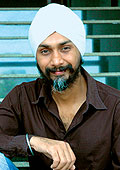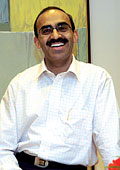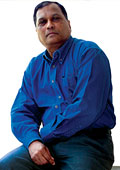|
 Six
years after he took up the reigns of Nasscom, India's it industry
lobby, Kiran Karnik, who turned 60 in March, is set to
retire. Karnik, who worked with ISRO for two decades and then
Discovery Networks India as MD, is expected to hand over the reins
sometime over the next three to nine months when a successor is
found. "Sixty is a good time to retire, but I will stay on board
until a suitable replacement is identified," says Karnik, who
denies that his decision is related to any conflicts within the
it industry. When Karnik joined Nasscom in 2001, the Indian it
industry was emerging from a bruising tech slowdown and BPOs were
just about taking off. Today, it services are worth $48 billion
(Rs 2,01,600 crore) in revenues, and BPOs $10 billion (Rs 42,000
crore). Perhaps even Karnik couldn't have imagined that things
would turn out this exciting.
Six
years after he took up the reigns of Nasscom, India's it industry
lobby, Kiran Karnik, who turned 60 in March, is set to
retire. Karnik, who worked with ISRO for two decades and then
Discovery Networks India as MD, is expected to hand over the reins
sometime over the next three to nine months when a successor is
found. "Sixty is a good time to retire, but I will stay on board
until a suitable replacement is identified," says Karnik, who
denies that his decision is related to any conflicts within the
it industry. When Karnik joined Nasscom in 2001, the Indian it
industry was emerging from a bruising tech slowdown and BPOs were
just about taking off. Today, it services are worth $48 billion
(Rs 2,01,600 crore) in revenues, and BPOs $10 billion (Rs 42,000
crore). Perhaps even Karnik couldn't have imagined that things
would turn out this exciting.
 Broader
Canvas Broader
Canvas
Do
a good job and get rewarded. Euro RSCG India has a new Chief Creative
Officer, and the new man is none other than Satbir Singh,
until recently its creative head in Delhi. It's a big vote of
confidence for the 36-year-old and, not surprisingly, he's feeling
a bit overwhelmed. "It's just started sinking in, the adrenalin
hasn't stopped pumping yet," he says with a grin. So what got
Singh the job? The fact that in his previous role he was instrumental
in clinching several new deals and dramatically improving the
standard of creative output. No prizes for guessing what his employer
wants him to do in the new role: Replicate the same results on
an all-India scale. Watch this man.
His New Bug
 Lots
of people would give their right arm to be in Kalanithi Maran's
shoes. his Sun TV network doesn't just have a stranglehold in
southern markets, but it's a money-spinner. For 2006-07, the media
major could report Rs 500 crore in revenues and a net profit of
Rs 250 crore. So why is Maran, 44, headed towards a money pit?
We are talking about Sun's planned foray into aviation, as disclosed
to the stock exchanges recently. Airlines are notoriously unprofitable-just
ask any of them in India. Maran was not available for comment,
but it is reasonable to assume that he will bring to aviation
the same cautious management philosophy that he uses in running
his media empire. For instance, he's still unwilling to foray
into North India, where the dynamics of the TV market are vastly
different. Therefore, it will be interesting to see what sort
of an airline model he comes up with. Lots
of people would give their right arm to be in Kalanithi Maran's
shoes. his Sun TV network doesn't just have a stranglehold in
southern markets, but it's a money-spinner. For 2006-07, the media
major could report Rs 500 crore in revenues and a net profit of
Rs 250 crore. So why is Maran, 44, headed towards a money pit?
We are talking about Sun's planned foray into aviation, as disclosed
to the stock exchanges recently. Airlines are notoriously unprofitable-just
ask any of them in India. Maran was not available for comment,
but it is reasonable to assume that he will bring to aviation
the same cautious management philosophy that he uses in running
his media empire. For instance, he's still unwilling to foray
into North India, where the dynamics of the TV market are vastly
different. Therefore, it will be interesting to see what sort
of an airline model he comes up with.
 A
Different Deal A
Different Deal
When
Anil Singhvi joined Gujarat Ambuja in 1986, the company,
according to him, had "no balance sheet and no turnover." Today,
it has a turnover in excess of Rs 5,000 crore. But end of April,
Singhvi, 46, hung up his boots as Managing Director of Gujarat
Ambuja, and donned the role of an investment advisor. He joined
Geneva-based asset management firm Notz Stucki as Partner, India
operations. But it may not be too much of a role change for him.
At Ambuja, Singhvi was responsible for some of the deals, be it
the buyouts of Modi Cements or DLF Cements, or the Big Bang Ambuja-Holcim
deal. He, however, speaks of the decision to acquire the 14.8
per cent stake in acc from the Tatas as the turning point for
Ambuja and him. "In retrospect, I think we should have consolidated
our position in acc," says Singhvi, a passionate tabla player.
Innovation Jump-Starter
 The
first time around US-born Dev Patnaik thought of coming
to India to take up a job, the travel agent tried to dissuade
him. He ignored the advice. Lucky him. Because it was at Pune-based
Forbes Marshall that Patnaik, 37, developed an approach to innovation
that went on to inform the philosophy of his innovation consulting
firm, Jump Associates. Now, Patnaik is back in India to help local
companies innovate. "Our existing clients (in the us) also want
to hear what the innovation landscape in India looks like-what's
really happening there, how can we help and what do we need to
know?," says Patnaik, who is looking forward to the birth of his
daughter. A product design graduate from Stanford University,
Patnaik is also an adjunct professor at the university and consults
with some top companies such as Nike, Harley Davidson and GE.
India isn't a big market for innovation. But that's precisely
why Patnaik is here. The
first time around US-born Dev Patnaik thought of coming
to India to take up a job, the travel agent tried to dissuade
him. He ignored the advice. Lucky him. Because it was at Pune-based
Forbes Marshall that Patnaik, 37, developed an approach to innovation
that went on to inform the philosophy of his innovation consulting
firm, Jump Associates. Now, Patnaik is back in India to help local
companies innovate. "Our existing clients (in the us) also want
to hear what the innovation landscape in India looks like-what's
really happening there, how can we help and what do we need to
know?," says Patnaik, who is looking forward to the birth of his
daughter. A product design graduate from Stanford University,
Patnaik is also an adjunct professor at the university and consults
with some top companies such as Nike, Harley Davidson and GE.
India isn't a big market for innovation. But that's precisely
why Patnaik is here.
 Planetary
Movement Planetary
Movement
He
is a naturalist and a wild life enthusiast when he is not at work.
and when at work, he is responsible for distributing cable and
satellite channels to our homes. Well, he is star India's 57-year-old
boss for distribution, who's all set to join Kalanithi Maran's
direct-to-home (DTH) venture, Sun Direct, as COO. While Tony
D'Silva formally joins from May 14, he has already started
doing his rounds of regional centres. "We expect to begin full
fledged operations by June," says D'Silva, who will be moving
from Mumbai to Chennai. To begin with, Sun Direct will focus on
the southern markets and then move to cities like Mumbai and Delhi,
where there are large numbers of south Indians. An old hand in
the television distribution business, D'Silva will report to Kalanithi,
since there are no plans to hire a CEO.
-Contributed by Deepti Khanna Bose,
Krishna Gopalan, Rahul Sachitanand,
Anusha Subramanian and Nitya Varadarajan
|






 Broader
Canvas
Broader
Canvas Lots
of people would give their right arm to be in Kalanithi Maran's
shoes. his Sun TV network doesn't just have a stranglehold in
southern markets, but it's a money-spinner. For 2006-07, the media
major could report Rs 500 crore in revenues and a net profit of
Rs 250 crore. So why is Maran, 44, headed towards a money pit?
We are talking about Sun's planned foray into aviation, as disclosed
to the stock exchanges recently. Airlines are notoriously unprofitable-just
ask any of them in India. Maran was not available for comment,
but it is reasonable to assume that he will bring to aviation
the same cautious management philosophy that he uses in running
his media empire. For instance, he's still unwilling to foray
into North India, where the dynamics of the TV market are vastly
different. Therefore, it will be interesting to see what sort
of an airline model he comes up with.
Lots
of people would give their right arm to be in Kalanithi Maran's
shoes. his Sun TV network doesn't just have a stranglehold in
southern markets, but it's a money-spinner. For 2006-07, the media
major could report Rs 500 crore in revenues and a net profit of
Rs 250 crore. So why is Maran, 44, headed towards a money pit?
We are talking about Sun's planned foray into aviation, as disclosed
to the stock exchanges recently. Airlines are notoriously unprofitable-just
ask any of them in India. Maran was not available for comment,
but it is reasonable to assume that he will bring to aviation
the same cautious management philosophy that he uses in running
his media empire. For instance, he's still unwilling to foray
into North India, where the dynamics of the TV market are vastly
different. Therefore, it will be interesting to see what sort
of an airline model he comes up with. A
Different Deal
A
Different Deal T
T Planetary
Movement
Planetary
Movement